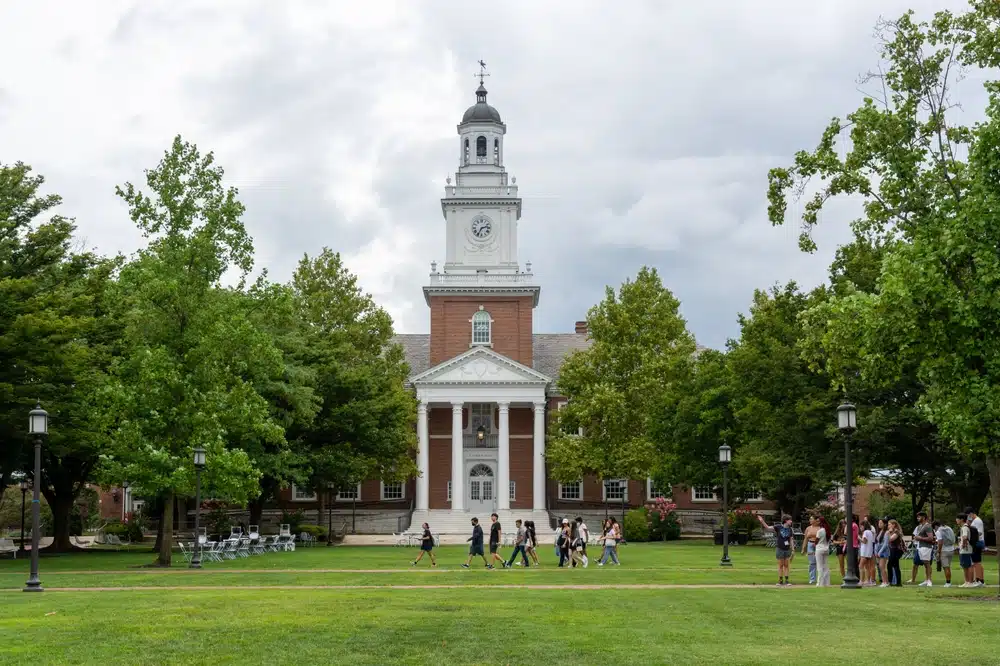Exploring Johns Hopkins’ Graduate School Experience
Making the decision to continue your education at a graduate school is a significant one that can profoundly impact your future. One of the institutions that should be at the top of your list is Johns Hopkins University. With a rich history, a diverse range of programs, a vast alumni network, and promising career opportunities, Johns Hopkins’ graduate school could be your ideal choice.
Understanding Johns Hopkins University
Johns Hopkins University is more than just a place of learning; it is a hub of innovation, research, and discovery. In order to fully appreciate the opportunities that an education at this distinguished institution provides, it’s crucial to understand its history, reputation, and infrastructure.
The History and Reputation of Johns Hopkins
Named after its notable benefactor, Johns Hopkins University was established in 1876 in Baltimore, Maryland. The initial aim was to revolutionize higher education by integrating teaching and research, a concept foreign to American education’s landscape at that time. This bold vision set the stage for the university’s remarkable journey.

Over the years, Johns Hopkins University has become synonymous with excellence. It has earned a prestigious reputation for its commitment to pushing boundaries and fostering innovation. The university’s impact on various fields, such as medicine, public health, and engineering, cannot be overstated. Pioneering breakthroughs in medical research, groundbreaking discoveries in public health, and revolutionary advancements in engineering have all originated from the laboratories and classrooms of Johns Hopkins.
With its unwavering dedication to excellence, it comes as no surprise that Johns Hopkins University consistently ranks among the top universities globally. This recognition is a testament to the institution’s unwavering pursuit of knowledge and ability to attract and nurture some of the brightest minds worldwide.
By fostering a multicultural and intellectually stimulating environment, Johns Hopkins University has created a vibrant community of scholars where ideas are exchanged, collaborations are formed, and lifelong connections are made. The diversity of perspectives and experiences enriches the educational journey, enabling students to broaden their horizons and develop a global mindset.
The Campus and Facilities at Johns Hopkins
Johns Hopkins University’s campus is a sight to behold. With its grand, historic architecture and meticulously maintained green spaces, the campus provides an inspiring backdrop for intellectual exploration and personal growth. The university’s commitment to preserving its rich heritage is evident in the preservation of its iconic buildings, which serve as a constant reminder of the institution’s storied past.
But it’s not just the aesthetics that make the campus special. Johns Hopkins University is equipped with state-of-the-art research facilities that rival the best in the world. These cutting-edge facilities provide students and faculty with the tools and resources necessary to push the boundaries of knowledge and make groundbreaking discoveries. From advanced laboratories to specialized equipment, the university spares no expense in ensuring its researchers have everything they need to excel in their respective fields.
For students seeking knowledge beyond the confines of textbooks, Johns Hopkins University offers well-stocked libraries that house countless academic resources. These libraries serve as intellectual havens, providing students access to a vast collection of books, journals, and digital resources. The quiet study areas, collaborative spaces, and expert librarians make the libraries an invaluable asset in the pursuit of knowledge.
Living on campus at Johns Hopkins University is an experience in itself. The university provides comfortable and modern residential facilities that offer students a home away from home. These living spaces foster a sense of community and provide a supportive personal and academic growth environment. The residential facilities are equipped with all the amenities to ensure students have a comfortable and enjoyable stay.
Johns Hopkins University also recognizes the importance of a well-rounded education. The institution has a robust infrastructure for co-curricular and extra-curricular activities. Students have the opportunity to join various clubs and organizations that cater to a wide range of interests. Whether it’s a passion for sports, arts, community service, or cultural exploration, there is something for everyone. The university’s sports facilities, cultural events, and community engagement initiatives provide avenues for students to explore their non-academic interests, develop new skills, and form lifelong friendships.
Ultimately, Johns Hopkins University is not just an institution of higher learning but a beacon of innovation, a catalyst for research, and a community of scholars. Its rich history, unwavering reputation for excellence, and state-of-the-art facilities make it a truly exceptional place to pursue an education. Whether in the classrooms, laboratories, libraries, or residential halls, every aspect of Johns Hopkins University is designed to inspire and empower students to reach their full potential.
The Graduate Programs at Johns Hopkins
At the heart of Johns Hopkins’ excellent reputation are its graduate programs. Covering a wide range of disciplines, the programs at this institution offer deep insight and comprehensive training in the chosen field of study.
Overview of Graduate Programs
Johns Hopkins University offers a variety of graduate programs through its various schools, including the Bloomberg School of Public Health, the School of Advanced International Studies, the Whiting School of Engineering, and others. Each school has its unique strength and focus, providing a broad platform for prospective students to find a program that aligns with their academic and career aspirations.
For instance, the Bloomberg School of Public Health is renowned for its groundbreaking research in public health. With a commitment to improving the health of populations worldwide, students in this program have the opportunity to work on projects that address pressing global health challenges, such as infectious diseases, environmental health, and health policy.

On the other hand, the School of Advanced International Studies offers graduate programs that prepare students for careers in international relations and global policy. With a focus on diplomacy, economics, and regional studies, students in this program gain a deep understanding of the complex dynamics shaping the world today.
The Whiting School of Engineering, known for its cutting-edge research and innovation, offers graduate programs that span various engineering disciplines, including biomedical engineering, computer science, and mechanical engineering. Students in these programs have the opportunity to work on groundbreaking projects, such as developing advanced prosthetics, designing autonomous vehicles, and creating sustainable energy solutions.
Whether you are looking to delve into research in the biological sciences, foster change through social work, make discoveries in medicine, or break barriers in artificial intelligence and robotics, Johns Hopkins has a place for you. You can prepare yourself for an impactful career through rigorous coursework, mentorship from renowned experts, and ample research opportunities.
Unique Features of Johns Hopkins Graduate Programs
What sets the Johns Hopkins graduate programs apart are their practical, research-focused approach and the emphasis on innovation. At Johns Hopkins, research is not just a component of the curriculum; it’s integral to the learning experience. This research-intensive environment has catapulted the university to the forefront of scientific discovery, with groundbreaking findings in various fields.
For example, the Department of Biomedical Engineering at Johns Hopkins has made significant contributions to regenerative medicine. Researchers in this department have developed innovative techniques to grow functional human tissues and organs, offering hope for patients in need of transplants.
In addition to research, Johns Hopkins also champions an interdisciplinary approach to learning, promoting collaboration across different fields of study. This enriching learning environment nurtures innovation and creativity, equipping students with the skills to tackle today’s challenges and those of the future.
Through interdisciplinary programs such as the Applied Physics Laboratory, students have the opportunity to work on projects that bridge the gap between science and real-world applications. From developing new imaging technologies for early cancer detection to designing advanced materials for renewable energy, students in these programs are at the forefront of cutting-edge research and innovation.
Furthermore, Johns Hopkins provides extensive resources and support for graduate students. The university’s libraries are home to vast collections of academic literature, ensuring that students have access to the latest research in their field. Additionally, the university hosts numerous conferences, seminars, and workshops, providing opportunities for students to present their work, network with experts, and gain valuable insights.
Overall, the graduate programs at Johns Hopkins University offer a unique and enriching educational experience. With a focus on research, innovation, and interdisciplinary collaboration, students are equipped with the knowledge and skills to make a meaningful impact in their chosen fields.
The Value of a Johns Hopkins Graduate Degree
A graduate degree from Johns Hopkins University equates to more than just a certification of academic achievement; it serves as a passport to myriad opportunities in a competitive job market.
When it comes to career opportunities after graduation, the education and training received at Johns Hopkins prepare one for an extensive range of options, depending on the course of study. Whether you aspire to become a leader in public health or a pioneer in technology, Johns Hopkins alumni can be found at the helm of various industries, making a significant impact.
One of the significant advantages of a Johns Hopkins education is the strong connections formed at the university. These connections go beyond classmates and faculty; they extend to experts and thought leaders in the industry. The university provides ample networking opportunities, allowing graduates to build relationships that can open doors to job prospects they might not have access to otherwise. The power of these connections cannot be underestimated in today’s competitive job market.
The Johns Hopkins Alumni Network
Graduating from Johns Hopkins is a lifelong distinction thanks to its illustrious alumni network. The university’s extensive network spans across the globe and encompasses numerous industries. Whether you are looking to connect with fellow alumni in your field or explore new opportunities in different industries, the Johns Hopkins alumni network is a valuable resource.
Being part of the Johns Hopkins community means being part of a network committed to supporting its members throughout their careers. The numerous events and programs designed for alumni provide opportunities to connect, share insights, and engage in lifelong learning even after graduation. From networking events to mentorship programs, the university ensures its graduates access ongoing support and professional development.
Moreover, the Johns Hopkins alumni network is not limited to a specific geographic location. With alumni spread across the globe, graduates can tap into a diverse global community, expanding their horizons and gaining valuable perspectives from different cultures and industries.
Whether you seek advice, seek job opportunities, or want to stay connected with the Johns Hopkins community, the alumni network offers a wealth of resources and connections that can help you navigate your professional journey.
Financial Aspects of Attending Johns Hopkins’ Graduate School
While the benefits of attending Johns Hopkins’ graduate schools are numerous, the financial aspects of such a decision require serious consideration.
Tuition and Financial Aid Options
Although the tuition fees for Johns Hopkins’ graduate school can be substantial, the university provides several financial aid options, including scholarships, grants, loans, and work-study opportunities. These aid options can significantly offset graduate school costs, making a Johns Hopkins education more accessible.
Moreover, the Financial Aid Office at Johns Hopkins is ready to assist prospective students in navigating their financing options and developing a feasible plan that aligns with their financial circumstances.
Return on Investment of a Johns Hopkins Graduate Degree
Despite the financial burden, a Johns Hopkins graduate degree represents a significant return on investment. A Johns Hopkins graduate degree enhances employability and earning potential by equipping students with highly sought-after skills, a versatile education, and a global perspective.
Moreover, the university’s robust support system and career services, which include counseling and job placement assistance, provide students with the resources necessary to succeed in their chosen fields, making a graduate degree from Johns Hopkins a wise financial investment.
Life as a Johns Hopkins Graduate Student
Besides the academic and financial aspects, it’s essential to consider the student life aspects in your decision-making process.
Student Life and Culture
Life as a Hopkins student is an engaging blend of rigorous academic pursuits and vibrant campus life. The diverse student body contributes to a dynamic cultural experience, and a variety of student organizations and activities are available for personal and professional growth outside the classroom.
Furthermore, the university’s commitment to diversity and inclusion ensures that all students feel valued and included, fostering an environment that celebrates differences and encourages open dialogue and understanding.
Housing and Living in Baltimore
Johns Hopkins University is situated in Baltimore, Maryland – a city that offers a unique combination of being home to rich historical landmarks and exciting contemporary attractions. From inspiring art and culture venues to satisfying culinary delights, this vibrant city has plenty to explore.

Johns Hopkins offers a variety of housing options, both on and off-campus, to accommodate the different needs of its graduate students. The housing office at Johns Hopkins can assist students in navigating their housing options, ensuring they have a comfortable and safe place to call home.
In conclusion, pursuing a graduate degree at Johns Hopkins University offers an enriching, rewarding experience that goes beyond acquiring a degree. It provides an opportunity to be part of a community driven to make a difference, sharpening one’s skills – and shaping one’s career – in the process.
If you need help putting the finishing touches on your college applications, at AdmissionSight, we have over 10 years of experience guiding students through the competitive admissions process.
AdmissionSight can help you put your best foot forward when applying to college this fall. Contact us today for more information on our services.





































